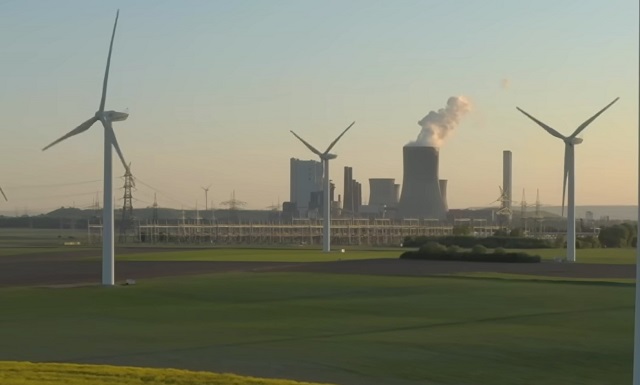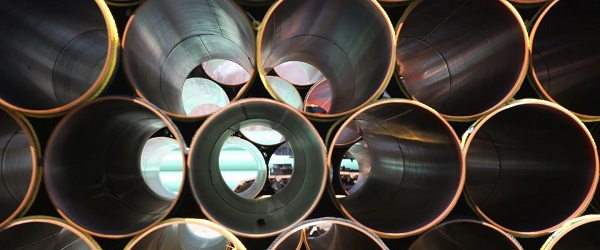Energy
Market Realities Are Throwing Wrench In Biden’s Green Energy Dreams

 From the Daily Caller News Foundation
From the Daily Caller News Foundation
For two years now, I and others have been pointing out the reality that there is no real “energy transition” happening around the world. Two new items of information came to light this week that irrevocably prove the point.
It is true that governments across the western world appear to be working to bankrupt their countries by pouring trillions of debt-funded dollars, Euros and British pounds into central planning efforts to subsidize renewables and electric vehicles into existence. That reality cannot be denied. The trouble is that no amount of debt money can turn the markets and the markets aren’t cooperating.
Despite all the government largesse that has spurred major additions of wind and solar generation capacity, those weather-reliant energy sources can’t even keep up with the pace of rising demand for electricity. As a result, the markets dictated that the world consumed record levels of coal, natural gas, oil and even wood during 2023. Yes, we are still burning vast amounts of wood for electricity, despite an alleged “transition” from wood to coal which began 500 years ago.
That is reality, dictated by the markets.
Two new bits of data came to light this week that pound the final nails into the coffin of the narrative around the energy transition. A report in the Financial Times, citing data compiled by Grid Strategies, reveals that the buildout of new high-voltage transmission lines in the United States slowed to a trickle in 2023, with just 55.5 additional miles installed. That collapse comes despite the Biden government’s recognition that a massive expansion of this type of transmission lines must happen to accommodate the demands of any true “transition” to renewables.
The Financial Times quotes a 2023 assessment by the Department of Energy that found that “regional transmission must more than double and interregional transmission must grow more than fivefold by 2035 to meet decarbonization targets.” DOE admits such a pace would add more than 50,000 miles of new transmission in just 11 years, which is almost 1,000 times the pace of adds during 2023. Yikes.
A crucial aspect of that DOE study to understand is that it was conducted before we began to understand the true magnitude of additional power demands that will result from the explosive growth of AI technology just now starting to come to full bloom. It was just this past January, at the WEF Forum in Davos, where OpenAI CEO Sam Altman told the audience he believes generation capacity on the grid will have to double over the next decade just to fill the AI demands alone. That is what is needed in addition to the rising demands for EV charging, industrial growth, population growth and economic growth.
The second piece of compelling data arising this week comes from a Bloomberg story headlined, “Data Centers Now Need a Reactor’s Worth of Power, Dominion Says.” The key thing to understand about this story is that the piece is only referencing the needs of planned new data centers being built in Northern Virginia to feed AI development in that tiny sliver of the United States.
This key excerpt from the story says it all: “Over the past five years, Dominion has connected 94 data centers that, together, consume about four gigawatts of electricity, Blue said. That means that just two or three of the data center campuses now being planned could require as much electricity as all the centers Dominion hooked up since about 2019.”
That is not just rapid growth, it is exponential growth in power demand from a single developing technology.
Demand growth needs such as this aren’t going to be filled by unpredictable, unreliable, weather-dependent generation like windmills and solar arrays. And let’s face it: The United States is not going to be able to continue expanding renewables without finding some way to create a massive expansion of transmission. Why build the generation if you can’t move the electricity?
What it all means is that all the grand Biden Green New Deal plans to shut down America’s remaining coal fleet and much of its natural gas generation fleet are going to have to wait, because the market will not allow them. That’s reality, and reality does not care about anyone’s green transition dreams.
David Blackmon is an energy writer and consultant based in Texas. He spent 40 years in the oil and gas business, where he specialized in public policy and communications.
The views and opinions expressed in this commentary are those of the author and do not reflect the official position of the Daily Caller News Foundation.
Energy
B.C. premier’s pipeline protestations based in fallacy not fact

From the Fraser Institute
The latest war of words over a pipeline in Canada is between Alberta Premier Danielle Smith, who seeks the construction of a pipeline from Alberta’s oilsands to export facilities on the Pacific coast, and British Columbia Premier David Eby who is foursquare against it.
Smith argues the pipeline is needed to break the U.S. market-lock on Alberta oil, which the United States buys at a discount compared to world prices. Smith argues that increased trade in oil and gas—at higher prices—would be good for Alberta’s economy and Canada’s national economy, and can be done while protecting the environment in both provinces. Eby denies virtually all these claims.
More specifically, Premier Eby makes four arguments against a new pipeline, and all are incorrect.
First, he argues, any pipeline would pose unmitigated risks to B.C.’s coastal environment. But in reality, the data are clear—oil transport off Canada’s coasts is very safe (since the mid-1990s there has not been a single major spill from oil tankers or other vessels in Canadian waters). He also simultaneously argues that it’s pointless to build a new pipeline from Alberta because B.C.’s waters are protected by Bill C-48, the “tanker ban” bill enacted by the Trudeau government in 2017. But in fact, because Bill C-48 only applies to Canadian tankers, a regular stream of oil tankers and large fuel-capacity ships cruise up and down the B.C. coast (between Alaska and other U.S. ports) with stupendous safety records.
Second, Eby argues that B.C.’s First Nations oppose any such pipeline. But in reality, such opposition is quite contingent. The Trans Mountain pipeline expansion project (TMX), which has increased shipping capacity from Alberta to the west coast, has signed agreements with 81 Indigenous community groups (in both provinces) worth $657 million and produced more than $4.8 billion in contracts with Indigenous businesses.
Third, Eby claims that Smith’s proposal is not “real” because no private-sector companies have proposed to build the pipeline. And he’s partly right—no rational investor would look at the regulatory barricade facing pipeline construction and spend the time and money to propose a project. Those applications cost money and lots of it. In 2017, according to TC Energy,before it retracted its Energy East/Eastern proposals due largely to regulatory barriers, the company had spent more than C$1 billion trying to get permits. In a 2016 report, Enbridge listed pre-construction expenditures (which include crafting proposals) of up to US$1.5 billion to build its three proposed pipeline projects. These costs will not have gotten cheaper since then. But even so, the Alberta government’s pipeline proposal has the backing of an advisory group, which includes energy companies Enbridge, Trans Mountain and South Bow—likely because they want to invest in the project after there’s some assurance it will survive the regulatory blockade.
Finally, Eby’s claim that there’s no market demand for new pipelines (which implies there will be no investors) is unsubstantiated. According to S&P Global, Canadian oilsands production will reach a record annual average of 3.5 million barrels of oil per day (b/d) in 2025, five per cent higher than 2024. By 2030, production could top 3.9 million b/d, 500,000 b/d higher than 2024 (although this assumes the federal cap on emissions, imposed by the Trudeau government, does not curtail production as predicted). This profit potential will almost certainly attract investors, if they can overcome the regulatory blockade.
It’s fine, of course, for Premier Eby to look out for the people of B.C. as best he sees fit—that’s his job, after all. But it’s also his job to recognize the limits of his authority. When looking at the TMX project, the Supreme Court of Canada has already ruled that B.C. does not have the authority to block infrastructure of national importance, including pipelines.
But as the saying goes, you’re entitled to your own opinion but not entitled to your own facts. Premier Eby’s objections to another Alberta pipeline are rooted in fallacy, not fact. The Carney government should recognize this fact and decide whether or not another pipeline to B.C. waters is in the “national interest,” which is apparently how you get a permit to build major projects in Canada these days.
Carbon Tax
Back Door Carbon Tax: Goal Of Climate Lawfare Movement To Drive Up Price Of Energy


From the Daily Caller News Foundation
The energy sector has long been a lightning rod for policy battles, but few moments crystallize the tension between environmental activism and economic reality quite like David Bookbinder’s recent admission. A veteran litigator who’s spent years spearheading lawsuits against major oil companies on behalf of Colorado municipalities — including Boulder — Bookbinder let the cat out of the bag during a recent Federalist Society panel.
In an all-too-rare acknowledgement of the lawfare campaign’s real goal, Bookbinder admitted that he views the lawsuits mainly as a proxy for a carbon tax. In other words, the winning or losing of any of the cases is irrelevant; in Bookbinder’s view, the process becomes the punishment as companies and ultimately consumers pay the price for using oil and gas and the industry’s refined products.
“Tort liability is an indirect carbon tax,” Bookbinder stated plainly. “You sue an oil company, an oil company is liable. The oil company then passes that liability on to the people who are buying its products … The people who buy those products are now going to be paying for the cost imposed by those products. … [This is] somewhat of a convoluted way to achieve the goals of a carbon tax.”
Dear Readers:
As a nonprofit, we are dependent on the generosity of our readers.
Please consider making a small donation of any amount here.
Thank you!
The cynicism is so thick you could cut it with a knife.
On one hand, the fact that winning is irrelevant to the plaintiff firms who bring the cases has become obvious over the last two years as case after case has been dismissed by judges in at least ten separate jurisdictions. The fact that almost every case has been dismissed on the same legal grounds only serves to illustrate that reality.
Bookbinder’s frank admission lands with particular force at a pivotal juncture. In late September, the Department of Justice, along with 26 state attorneys general and more than 100 members of Congress, urged the Supreme Court to grant certiorari in one of the few remaining active cases in this lawfare effort, in Boulder, Colorado.
Their briefs contend that allowing these suits to proceed unchecked would “upend the constitutional balance” between federal and state authority, potentially “bankrupt[ing] the U.S. energy sector” by empowering local courts to override national energy policy.
For the companies named in the suits, these cases represent not just a tiresome form of legal Kabuki Theater, but a financial and time sink that cuts profits and inhibits capital investments in more productive enterprises. You know, like producing oil and gas to meet America’s ravenous energy needs in an age of explosive artificial intelligence growth.
“I’d prefer an actual carbon tax, but if we can’t get one of those, and I don’t think anyone on this panel would [dis]agree Congress is likely to take on climate change anytime soon—so this is a rather convoluted way to achieve the goals of a carbon tax,” Bookbinder elaborated in his panel discussion.
John Yoo, the eminent UC Berkeley law professor and former Bush-era official, didn’t hold back in his analysis for National Review. He described the lawfare campaign as a “backdoor” assault on the energy industry, circumventing the federal government’s established role in environmental regulation.
“There are a variety of cities and states that don’t agree with the federal government, and they would like to see the energy companies taxed,” Yoo explained. “Some of them probably like to see them go out of business. Since they can’t persuade through the normal political process of elections and legislation like the rest of the country, they’re using this back door,” he added.
What we see in action here is the fact that, although the climate alarm industry that is largely funded by an array of dark money NGOs and billionaire foundations finds itself on the defensive amid the aggressive policy actions of the Trump 47 administration, it is far from dead. Like the Democrat party in which they play an integral role, the alarmists are fighting the battle in their last bastion of power: The courts.
As long as there are city and county officials willing to play the role of plaintiffs in this long running Kabuki dance, and a Supreme Court unwilling to intercede, no one should doubt that this stealth carbon tax lawfare effort will keep marching right along.
-

 Health23 hours ago
Health23 hours agoFor Anyone Planning on Getting or Mandating Others to Get an Influenza Vaccine (Flu Shot)
-

 Business2 days ago
Business2 days ago$15B and No Guarantees? Stellantis Deal explained by former Conservative Shadow Minister of Innovation, Science and Technology
-

 Alberta1 day ago
Alberta1 day agoPremier Smith moves to protect Alberta in International Agreements
-

 Business24 hours ago
Business24 hours agoLiberals backtrack on bill banning large cash gifts, allowing police to search Canadians’ mail
-

 Agriculture2 days ago
Agriculture2 days agoFrom Underdog to Top Broodmare
-

 Sports23 hours ago
Sports23 hours ago‘We Follow The Money’: Kash Patel Says Alleged NBA Ties To Mafia Just ‘The Start’ Of FBI Investigation
-

 Bruce Dowbiggin2 days ago
Bruce Dowbiggin2 days agoIs The Latest Tiger Woods’ Injury Also A Death Knell For PGA Champions Golf?
-

 Health2 days ago
Health2 days agoSovereignty at Stake: Why Parliament Must Review Treaties Before They’re Signed





